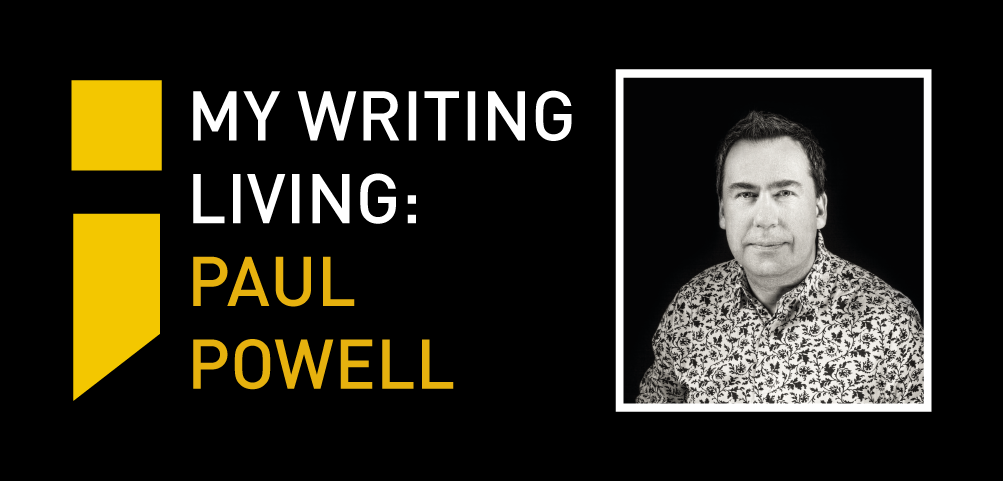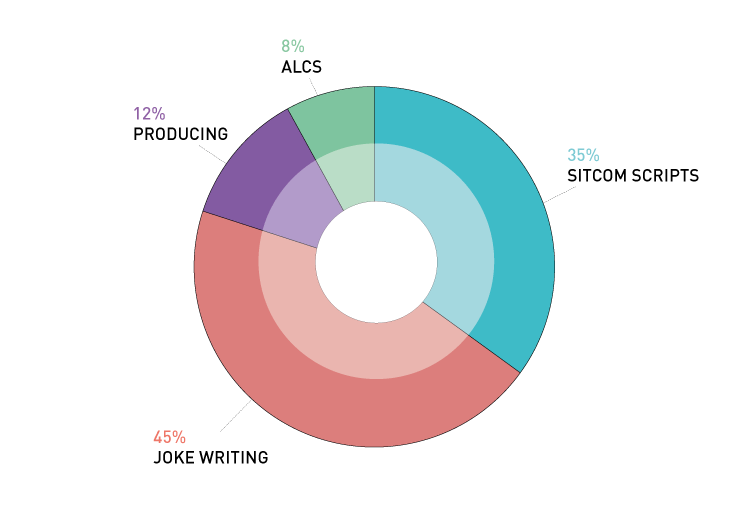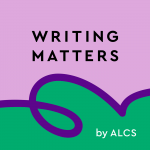My Writing Living: Paul Powell

Despite falling commissioning budgets and having to wage an almost constant battle against online piracy, comedy writer Paul Powell tells us why he believes he has the best job in the world.
“I like to think that my job is incredibly difficult”, quips Paul Powell when asked about the constant pressure to create laughter which comes with being a comedy writer. “I have this running joke with my colleagues Dan (Gaster) and Will (Ing) that we have the hardest job in the business. Because we have to write drama, and then make it funny”.
During his almost 30-year career, Paul has worked with a host of famous names including Miranda Hart, Sue Perkins and Griff Rhys Jones. He’s also written material for numerous high-profile TV shows and specials, including Nelson Mandela’s 90th birthday tribute concert, the Queen’s Diamond Jubilee and the Royal Variety Performance. Working on behalf of his production company, Black Dog Television of which he is a creative director, Paul co-wrote the sitcom Zapped for UKTV and the panel show Insert Name Here for BBC2.
When and how did he get started in comedy? “At that time I left university in 1991 BBC Radio 4 had a sort of open door policy for their topical satire show, Weekending. So you could literally come off the street, into a meeting with the producer and pitch your ideas for sketches. I got a foothold there and started to get my material on air. I then got to know other producers and to work on other shows, and things built from there”.
Sometimes it’s frustrating because such work is usually anonymous and you have to do it behind the scenes without any credit.
Paul first worked in television around 1993, writing initially for Spitting Image and then moving into other areas. “I did lots of gag writing and script editing as well as writing my own material. I did a sketch show on Radio 4, and a topical show on ITV both of which I wrote and performed”. These days he combines writing and pitching his own scripts through Black Dog Television, with working for other people. “I could be rewriting a script, or writing gags for a comedian. And quite often I’m brought in to pep up someone’s work. Sometimes it’s frustrating because such work is usually anonymous and you have to do it behind the scenes without any credit. But what’s good is that I can use these paying gigs to fund my own development because what I really want to do is my own shows. The nature of my job has always been that: doing the bread and butter gigs to pay the mortgage, get my face out there and establish a reputation. It’s taught me a lot of good discipline, and how to write quickly for a variety of different voices. Fundamentally though, I’m still doing the same thing I’ve always done which is sitting at a blank piece of paper and drinking too much coffee”.
Despite the fact that Paul now has an enviable CV and address book of contacts, ensuring a regular stream of work has undoubtedly become more difficult, he says. “There just isn’t the development money that there used to be. That makes it very hard to develop a new show and get it away. Which is why now increasingly you’ll see safe commissions, such as those from writer-performers who are a known quantity”.
The wholesale changes in the landscape of broadcasting have also made earning a living from comedy more difficult. “TV has been totally revolutionised by Netflix and Amazon and other platforms coming in now like Quibi and BritBox. The standard foundation of broadcasting as it was doesn’t exist anymore. Many of the new commissioners are hard to reach: a lot are based in America, and most don’t have an obligation towards public remits like the BBC did, or even Channel 4 does. So it’s hard to make contact with these people, and it’s also hard to know what they want ”.
We need to say to people: you can watch this stuff legitimately on iPlayer, or on Netflix. It doesn’t cost much but every single rating, every single contribution matters to the creator.
Paul also increasingly faces a battle against online copyright infringement. “Take our panel show, Insert Name Here. It went out on BBC2 and was available on iPlayer for 28 days. In that first month, every rating, every single click makes a difference. But every day the show was being shared illegally on sites like YouTube and Reddit. I was constantly having to issue take-down notices. That’s infuriating because it affects not just my livelihood, but that of everyone who works on the show, including people behind the scenes. It’s frustrating that the BBC say it’s the copyright owner’s problem, not theirs. I also really wish Google would do more to police its own website. Constantly issuing take down notices is not only tedious, it’s also like whack-a-mole: you get one infringement removed and another pops up. But I felt it was really important for me to make a stand, both to protect my own show, and also because people need to know that this stuff is not valueless”.
Paul’s average income sources

Doesn’t this state of affairs also highlight the compelling need for copyright education, something ALCS has long been heavily invested in?
“Absolutely. We need to say to people: you can watch this stuff legitimately on iPlayer, or on Netflix. It doesn’t cost much but every single rating, every single contribution matters to the creator. It’s about educating people that these things have a value, that there are lives involved and that copyright theft is not a victimless crime. I feel very grateful to ALCS for what they’re doing”.
I don’t think you can do any better than try to write something that makes you laugh rather than trying to second-guess what will appeal to other people.
Paul spent six years as an executive director as ALCS and is now a patron of the Society of Audiovisual Authors. I ask him why he’s made it his business as a writer to be involved with such organisations.
“Well I’m very aware that although I’ve managed to make a living for 30 or so years, there are people out there who struggle to make any decent money at all, let alone what you might call a living. Frankly it’s ridiculous how little most writers are being paid, and how little influence they have over how their work is used. So I think it’s great that ALCS is there to encourage writers to stand up and be heard”.
And what advice would he give anyone just starting out as a comedy writer?
“Don’t get a big mortgage! Don’t have any dreams of having a big car! Apart from that, I’d say: it’s the best job in the world. I love what I do and if you want to do it too, then go for it. My main advice would be: Write, write, write. Keep producing work, and then get others to critique it. You mustn’t be afraid to show your work to people you trust and get feedback because in comedy, you’ve got to learn to take it on the chin when people say: that’s not funny. Having said that, I don’t think you can do any better than try to write something that makes you laugh rather than trying to second-guess what will appeal to other people. So find your own voice and amplify it”.
Interview by Caroline Sanderson

You can listen to the full discussion between Caroline and Paul Powell on Writing Matters, the new ALCS podcast where we talk to writers from across the profession about how they earn their living.
